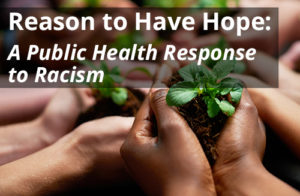New Anti-Racism Curriculum to Help Participants Discern Their Calls to Action

Reason to Have Hope: A Public Health Response to Racism — a multi-part, online, interactive, and highly adaptable course created by CHHSM — is now online. The innovative, user-friendly curriculum is geared for a group learning environment, and includes history, current events, theology, stories of resilience, and the intersections of race and social issues to help members of faith-based organizations and local churches learn from not only the material, but each other.
“My hope is that folks within congregations and CHHSM organizations can go through the course together, utilize the reflection questions to start conversations, and learn from each other’s life experiences connected to the material,” said the Rev. Dr. Elyse Berry, CHHSM’s associate for advocacy and leadership development, and author of the curriculum. “I hope that, as people go through the chapters, they can gain clarity on what a next step might look like for them — personally within their congregation or organization, or within their city or state.”
Each chapter includes reading material, podcasts, and/or videos on a specific topic, as well as a section on hope for the future, which highlights a success story. There also are materials to support facilitators leading a group through the chapters. The content was created so that a study group’s members could have the option of dividing the content and presenting the material to each other, thus interweaving personal experiences with the lesson materials.
“All throughout the course, there are examples of inspiring communities who have taken action on these issues, wisdom from a variety of anti-oppression social movements, as well as several tools of discernment to pause and reflect on what you may be called to do with your particular gifts,” Berry said. “The material is a reminder that we are in this together — that we must be in it together.”
“I hope that the prayer pauses woven throughout the course support the faith-based communities to really be together in this learning journey,” Berry added. “This self work, this communal work, is part of what we are trying to deeply understand and embody, alongside facts and figures about this crisis.”
The curriculum is set up so that groups can pick and choose which areas they wish to study. The only required chapter is the first, on grounding, which gives a foundation for the work ahead. “Anti-racism is deeply spiritual work,” said Berry. “It is embodied work, so we must start with the body. This first section examines grounding — in your body, in scripture, in understanding power, on your unique place in the ecosystem of social change, and what God might have to say to you in all of this.”
Reason to Have Hope includes such chapters as racism in medicine, health disparities, health equity, poverty, trauma, and health ministries, among others. Different sections will be important to different groups. “Depending on your starting place in approaching racism as a public health crisis, various portions may be more important to you than others,” Berry said. “Additionally, the content is all connected and builds off previous lessons in order to give group members a fuller picture of this complex public health crisis of racism and health inequity.”
The genesis of Reason to Have Hope came from a General Synod Resolution of Witness, which will be brought to delegates this summer by CHHSM and the UCC’s Council on Racial and Ethnic Ministries. After reviewing “A Resolution to Declare and Respond to Racism as a Public Health Crisis,” Synod committee members contacted Berry and requested that a curriculum be developed to assist all settings of the church in achieving the goals of the resolution.
“Because the resolution was co-authored by CHHSM and COREM, the content both organizations found essential to include in the resolution itself are included in the course,” Berry said. “It provided the essential framework for issues to cover and resources to utilize.”
The final section of the curriculum is a Benediction of Belonging, which serves to remind participants of their inherent connectedness and worth, Berry said.
Regardless of how groups approach Reason to Have Hope, the material “makes clear that racism shows up in every system and structure in this country, and that the aspects of daily life — where you live, learn, work, and age — impact health and well-being,” said Berry. “This is systems-level thinking to get to better systems-level solutions. That is one of the gifts of the public health framework: it holds direct service, education, research, and policy all in the same ecosystem.”
CHHSM President and CEO Michael J. Readinger concurred. “Understanding the magnitude and history of racism in public health — and society as a whole — is imperative in becoming anti-racist,” Readinger said. “Reason to Have Hope offers information, yes, but also tangible ways to move past the discussion stage in order to implement real change as, together, we create a more just, caring and compassionate world.”
The new curriculum was released June 18, ahead of and in recognition of the Juneteenth holiday.
Join Our Mailing LIst
"*" indicates required fields
Follow on Facebook
www.chhsm.org
Volunteer ministries require special commitment and dedication, traits that are tested during times of change. To facilitate a new way of doing outdoor ministry in the UCC’s Heartland Conference, Ji...